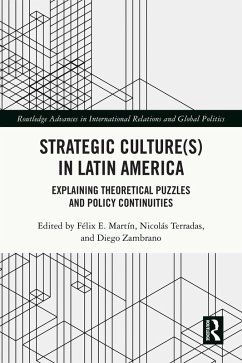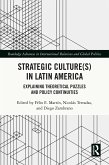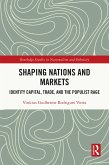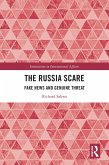Strategic Culture(s) in Latin America (eBook, PDF)
Explaining Theoretical Puzzles and Policy Continuities
Redaktion: Martín, Félix E.; Zambrano, Diego; Terradas, Nicolás
41,95 €
41,95 €
inkl. MwSt.
Sofort per Download lieferbar

21 °P sammeln
41,95 €
Als Download kaufen

41,95 €
inkl. MwSt.
Sofort per Download lieferbar

21 °P sammeln
Jetzt verschenken
Alle Infos zum eBook verschenken
41,95 €
inkl. MwSt.
Sofort per Download lieferbar
Alle Infos zum eBook verschenken

21 °P sammeln
Strategic Culture(s) in Latin America (eBook, PDF)
Explaining Theoretical Puzzles and Policy Continuities
Redaktion: Martín, Félix E.; Zambrano, Diego; Terradas, Nicolás
- Format: PDF
- Merkliste
- Auf die Merkliste
- Bewerten Bewerten
- Teilen
- Produkt teilen
- Produkterinnerung
- Produkterinnerung

Bitte loggen Sie sich zunächst in Ihr Kundenkonto ein oder registrieren Sie sich bei
bücher.de, um das eBook-Abo tolino select nutzen zu können.
Hier können Sie sich einloggen
Hier können Sie sich einloggen
Sie sind bereits eingeloggt. Klicken Sie auf 2. tolino select Abo, um fortzufahren.

Bitte loggen Sie sich zunächst in Ihr Kundenkonto ein oder registrieren Sie sich bei bücher.de, um das eBook-Abo tolino select nutzen zu können.
Strategic Culture(s) in Latin America elucidates why many state-actors in the Global South exhibit a remarkable degree of policy continuity in their external behavior despite structural incentives for change.
- Geräte: PC
- mit Kopierschutz
- eBook Hilfe
Andere Kunden interessierten sich auch für
![Strategic Culture(s) in Latin America (eBook, ePUB) Strategic Culture(s) in Latin America (eBook, ePUB)]() Strategic Culture(s) in Latin America (eBook, ePUB)41,95 €
Strategic Culture(s) in Latin America (eBook, ePUB)41,95 €![Agency, Security and Governance of Small States (eBook, PDF) Agency, Security and Governance of Small States (eBook, PDF)]() Agency, Security and Governance of Small States (eBook, PDF)41,95 €
Agency, Security and Governance of Small States (eBook, PDF)41,95 €![Latin America in Global International Relations (eBook, PDF) Latin America in Global International Relations (eBook, PDF)]() Latin America in Global International Relations (eBook, PDF)39,95 €
Latin America in Global International Relations (eBook, PDF)39,95 €![Russian Westernizers and Change in International Relations (eBook, PDF) Russian Westernizers and Change in International Relations (eBook, PDF)]() Andrei P. TsygankovRussian Westernizers and Change in International Relations (eBook, PDF)40,95 €
Andrei P. TsygankovRussian Westernizers and Change in International Relations (eBook, PDF)40,95 €![Shaping Nations and Markets (eBook, PDF) Shaping Nations and Markets (eBook, PDF)]() Vinícius Guilherme Rodrigues VieiraShaping Nations and Markets (eBook, PDF)41,95 €
Vinícius Guilherme Rodrigues VieiraShaping Nations and Markets (eBook, PDF)41,95 €![The Russia Scare (eBook, PDF) The Russia Scare (eBook, PDF)]() Richard SakwaThe Russia Scare (eBook, PDF)44,95 €
Richard SakwaThe Russia Scare (eBook, PDF)44,95 €![Russian Realism (eBook, PDF) Russian Realism (eBook, PDF)]() Andrei P. TsygankovRussian Realism (eBook, PDF)43,95 €
Andrei P. TsygankovRussian Realism (eBook, PDF)43,95 €-
-
-
Strategic Culture(s) in Latin America elucidates why many state-actors in the Global South exhibit a remarkable degree of policy continuity in their external behavior despite structural incentives for change.
Dieser Download kann aus rechtlichen Gründen nur mit Rechnungsadresse in A, B, BG, CY, CZ, D, DK, EW, E, FIN, F, GR, HR, H, IRL, I, LT, L, LR, M, NL, PL, P, R, S, SLO, SK ausgeliefert werden.
Produktdetails
- Produktdetails
- Verlag: Taylor & Francis eBooks
- Seitenzahl: 256
- Erscheinungstermin: 17. November 2023
- Englisch
- ISBN-13: 9781003800460
- Artikelnr.: 69058775
- Verlag: Taylor & Francis eBooks
- Seitenzahl: 256
- Erscheinungstermin: 17. November 2023
- Englisch
- ISBN-13: 9781003800460
- Artikelnr.: 69058775
- Herstellerkennzeichnung Die Herstellerinformationen sind derzeit nicht verfügbar.
Félix E. Martín is an Associate Professor in the Department of Politics and International Relations in the School of International and Public Affairs at Florida International University in Miami, USA. His areas of specialization include international relations theory, security and peace studies, and international political economy. He is a specialist in the security and political economy of Latin America and Southern Europe. He is currently working on a forthcoming book with Edward Elgar Publishing on the notion of "dis-development," its theoretical foundations, and its manifestations in selected Latin American countries. Nicolás Terradas is a tenure-track Assistant Professor in the Department of Social Sciences at the Pontifical Catholic University of Peru (P UCP), in Lima, Peru, where he teaches courses on IR Theory, Methodology, and IR of Latin America. His general research interests are IR Theory, Security Studies, and Latin American international politics. Currently, his work explores the application of English School insights to the study of Latin America's international politics, as well as the incorporation of qualitative research tools, such as processtracing analysis, archival research, and case-study research, to the English School methods. Diego Zambrano is a research and performance analyst at Paradine. His academic research focuses on International Political Economy, particularly on how global economic conditions shape political and economic relations in South America. His doctoral dissertation from Florida International University in Miami, USA, reinterprets the formation of the South American state to explain the continuity of poverty and inequality in the region.
Foreword Introduction PART I: THE THEORETICAL FRAMEWORK 1. The Concept of Strategic Culture 2. Updating, Decentering, and Extending Strategic Culture PART II: LATIN AMERICAN CASE STUDIES 3. The Role of "Diplomatic Culture" in the Preservation of Order in South America 4. South American Political Economy: Strategic Culture and the Question of Agency 5. Militaries as Influencers and Gatekeepers: Continuity of the Intraregional War-Avoidance Policy 6. The Strategic Culture of Prohibition and the Puzzling Continuity of Drug Policies in South America 7. No Place for Cosmopolitan Peacekeeping: South America and Its Prevailing Strategic Culture of Security PART III: CONCLUSIONS 8. Strategic Culture Travels to Latin America Conclusion
Foreword Introduction PART I: THE THEORETICAL FRAMEWORK 1. The Concept of Strategic Culture 2. Updating, Decentering, and Extending Strategic Culture PART II: LATIN AMERICAN CASE STUDIES 3. The Role of "Diplomatic Culture" in the Preservation of Order in South America 4. South American Political Economy: Strategic Culture and the Question of Agency 5. Militaries as Influencers and Gatekeepers: Continuity of the Intraregional War-Avoidance Policy 6. The Strategic Culture of Prohibition and the Puzzling Continuity of Drug Policies in South America 7. No Place for Cosmopolitan Peacekeeping: South America and Its Prevailing Strategic Culture of Security PART III: CONCLUSIONS 8. Strategic Culture Travels to Latin America Conclusion







